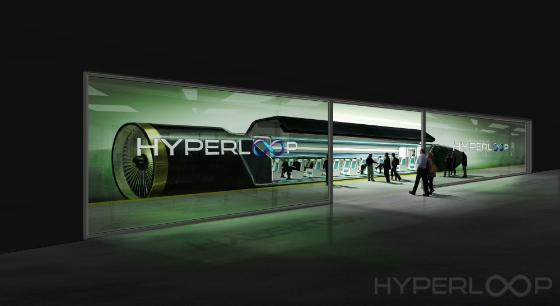The science-fiction-like plan of business magnate Elon Musk's tube-based transport system could be in the Persian Gulf desert in the next decade.
Hyperloop One, a US-based tech company, plans to get approval from officials in the United Arab Emirates to start constructing a hyperloop transport system between Dubai and Abu Dhabi, according to a Reuters report.
A hyperloop system uses pressurized tubes and magnets to levitate travel pods that could move at up to 720 miles per hour, meaning that commuters could travel between Dubai and Abu Dhabi in approximately 12 minutes.
The plan, which was originally designed by Elon Musk for transport between Los Angeles and San Francisco, has been put through various rounds of engineering guidance and now seems almost ready for prime time.
The Dubai Road and Transport Authority (RTA) has signed off on a plan to pursue the transport system, which is projected to replace up to 4,000 vehicles every day and save $800 million in wages attached to working hours that are currently lost in transportation.
“There are no rules to regulate the Hyperloop today, we'll need to collaborate in the creation of those rules,” Rob Lloyd, chief executive officer of Hyperloop One, said. “The objective would be to create a playbook for regulatory approvals, and we're working with some of the experts around the world to do that. We think we need to have that done in 2018 timeframe, so we can begin construction in 2019 and go into production of the Hyperloop somewhere in the region of 2020 to 2021."
For more, the Gulf News Journal spoke with Harry Keller, president of Smart Science, an educational technology company.
“I think it's really exciting,” Keller said. “It wouldn’t be like riding a train.”
Keller said the “little torpedo-like” travel pods do not offer a lot of headroom or legroom.
“It's a very small space that you're in,” Keller said, suggesting people with severe claustrophobia might not like it.
Keller said the trade-off is the ultra-short commute.
“The times are short enough that most people wouldn’t have a problem with that,” Keller said.
As for safety, Keller said various engineering safety redundancies would result in a pretty strong model for safe travel.
“They were designed to be very safe,” Keller said.
The big challenge, he said, is evacuating space in front of the pods, which is done by pumping air out of the tube.
Look for more updates as this rapidly modernizing area of the globe tries a cutting-edge form of transportation that is poised to change how we travel.
Gulf News Journal
15 March

























































